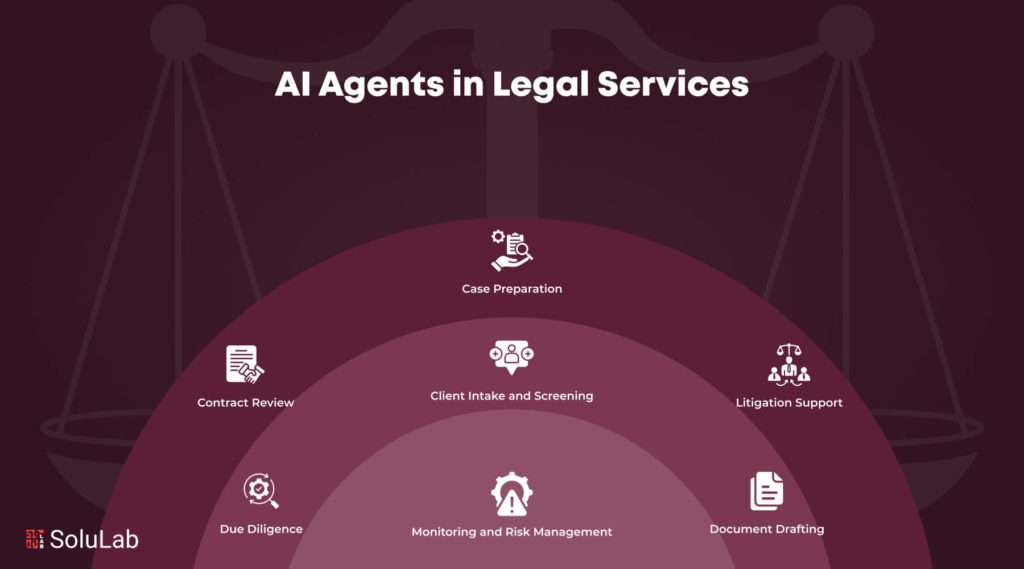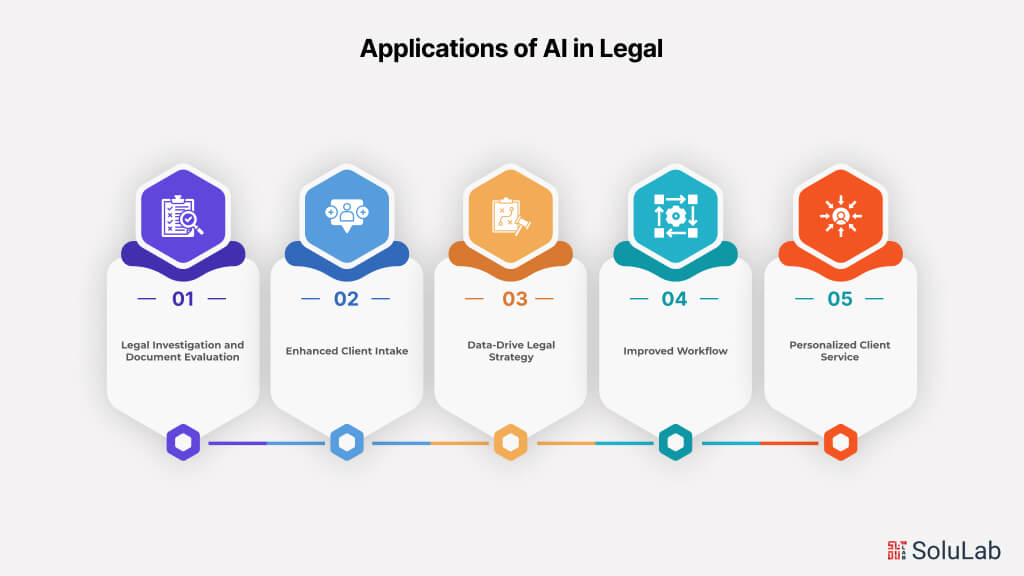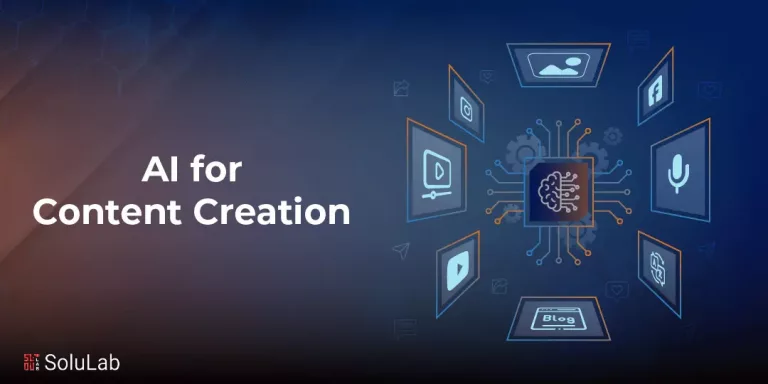
Have you ever imagined a world where legal tasks are also being handled by virtual assistants like AI Agents for Law Firms? These tireless intelligent agents are capable of understanding huge piles of data and identifying precedents for drafting legal documents, they can draft one themselves too! The Benefits of AI Agents in Legal are due to their ability to design, learn, and adapt to perform specific tasks to increase legal transparency, efficiency, and accuracy. AI Agents can analyze contracts, research case law, and predict possible legal outcomes which in turn free up lawyers’ time for thinking and client interaction. Even in the early stages, AI agents have the power to transform the legal ways of operating and make it more accessible, effective, and efficient. It is seen that 40% of law firms that use AI have seen ROI in the first year.
This blog will help you have a deep understanding of what are legal services, how AI Agents help with them, the benefits they hold, the future of AI agents in the legal sector, and the workflow of AI agents in legal services.
What are AI Agents in Legal Services?
AI Agents in Legal Services are software programs designed to help with specific legal tasks that are often done efficiently and accurately. The use of AI in legal services also assists with the legal research for drafting legal documents. Beyond document research and reviewing legal AI services are used to automate repetitive tasks, manage client communication, and predict case outcomes. This gives lawyers the time to focus more on client strategy and complex legal arguments. When law and AI are combined they rapidly evolve promising to transform the industry and make legal services more accessible to everyone. Here are some points to understand artificial intelligence for lawyers better:
1. Case Preparation with Legal Research
It has become quite easy for AI Agents For Legal workflow to quickly analyze vast amounts of legal data, and identify relevant law cases, and statuses which will help lawyers to prepare more efficiently for cases. AI tools can help lawyers identify their potential arguments and strategies giving them a higher place in the competitive edge.
2. Cost Efficiency
AI agent use cases have made it pretty evident that it can automate tasks, reducing the need for manual labor and potentially lowering legal fees for clients. With the use of legal AI services tasks like document review, drafting documents, and legal research are done accurately, and no need for lawyers to do it themselves, which leads to significant cost-saving for not only lawyers but also for the clients.
3. Error Reduction
AI Agents for Legal offers you the ability to reduce possible errors with no looking after required. It helps reduce errors in legal work by performing tasks with more accuracy than humans ever could. It is easier with the use of AI in legal services to identify potential eros to ensure an even more accurate performance with relevant laws and regulations.
4. Ethics and Integration
Legal AI services integration requires ethical considerations too such as transparency, accountability, and fairness in all AI-powered decisions. It is extremely important for AI tools to ensure that their use is done responsibly and ethically, without any biases involved. The legal profession is something that cannot overlook the ethical considerations even with the implications of AI and develop guidelines for more responsible use.
How Do AI Agents Work for Law Firms?
AI is constantly transforming the legal landscape by offering law firms many powerful tools for enhancing productivity and client service. These AI agents not only handle tasks but also keep track of complex legal analysis and routine administrative tasks. Here is how AI for legal services operates:
-
Client Intake and Screening
With artificial intelligence for lawyers, enterprise chatbots can easily manage initial client inquiries, gather basic information, and determine if the firm is a good fit for their needs or not. These chatbots can assist you with qualifying questions, assess the complexity of the legal issue, and also brief you about the preliminary cost estimates. These legal AI services help with streamlining the intake process and also free up time for focusing on more complex issues for a more strategic legal approach and high-value client interactions.
-
Contract Review and Analysis
AI legal services possess the ability to analyze contracts, identify potential risks involved, and areas of negotiation. With the use of natural language learning (NLP) and machine learning (ML) algorithms, AI for legal services can quickly scan contracts for key terms and keep a close comparison with industry standards to help lawyers deeply understand the key terms of a specific contract for providing better advise to the clients, in turn saving valuable time and resources. This also makes sure that the advice is by the contract only. AI-powered contract review tools can cut review times by 20-90%
-
Due Diligence
AI Agents For Legal Workflows can shift through piles of data, relevant case law identification, and regulations for analyzing legal databases, identify relevant precedents, and even suggest an outcome of the case based on historical data. This not only accelerates research and due diligence but also allows lawyers to focus on client communication in a much effective way which leads to an informed and effective legal strategy. Also offers consistency throughout the legal process by keeping checks on documents and data points.
-
Litigation Support
AI Agents for Legal hold the ability to read past cases and trends for predicting the outcome of existing litigation. This is made possible by analyzing large datasets of past cases, AI can identify patterns and trends, for predicting the likelihood of success or failure in a provided case. This alone helps lawyers develop more effective strategies and advise clients on potential risks and rewards, giving them space to make informed decisions about settlement negotiations or trial preparations. With the help of AI Agents, evidence can be understood more clearly and quickly than humans and not be missed.
-
Document Drafting
The accretion of routine legal documents can be automated with artificial intelligence legal such as contracts, wills, and power of attorney. Also, the use of AI in legal services document automation tools can generate personalized documents based on client-specific information, which ensures privacy accuracy and consistency. This saves lawyers time and ensures consistency in document drafting, freeing them to focus on more complex legal tasks.
-
Monitoring and Risk Management
Legal AI services can monitor regulatory changes and identify potential compliance risks for clients. AI-powered compliance monitoring tools can track regulatory updates, identify potential violations, and even generate reports on compliance status. This helps law firms identify and mitigate related risks compliance risks, ensuring their clients remain compliant with evolving regulations and avoid costly penalties.
Applications of AI in Legal

AI agents are not just elements in movies anymore; they are tools that assist in making better decisions, automating processes, and helping firms function better. Let’s examine some particular use cases as we dig into the fascinating uses of AI in the legal sector
Legal Investigation and Document Evaluation
In the past, it would have consisted of very time-consuming manual work of little efficiency. AI Agents For Legal Workflows run a large number of contracts, case law, and documents through Natural Language Processing (NLP). Employing keywords and the parameters of the search, they can find other similar cases, underline potential risks, and define the necessary phrases. During the creation of a new product, a legal company of a tech start-up analyzes competitors’ applications through the AI system. The purpose of this identification of any problems is that it allows the firm to inform the customer of the relevant changes that would be needed before the launch.
Enhanced Client Intake
The first client intake procedure can be efficiently managed by legal companies with the help of AI-powered chatbots. Such applications can schedule meetings, gather crucial client information, and offer elementary legal advice 24/7, which would free significant working hours for lawyers and paralegals. Law and AI can review huge amounts of public documents and financial statements for due diligence, find potential problems, and simplify the neon-signals due diligence for complex transactions. A legal corporation engages a chatbot to answer frequently asked questions on incorporation. It becomes easier for potential customers to obtain preliminary information and schedule meetings.
Data-Drive Legal Strategy
The use of this data for analysis means that in turn, artificial intelligence for lawyers can look at this data and come up with more solid patterns and forecasts with the outcome of the case, as well as come up with shortcomings in the presentations made by the other side of the argument. This enables lawyers to come up with strategies for dealing with the situations depending on the existing data when they are involved in the case. For example, a legal company, representing a client in an environmental lawsuit employs the use of AI, to seek through past decided cases similar to the circumstances of the client. This way, the firm can reframe the arguments to be stronger and one is that the AI is capable of identifying aspects that contributed to the outcomes in question.
Improved Workflow
Artificial intelligence legal automation does scheduling, arrangement of documents, and research jobs well and within a short time. This relieves lawyers and other legal workers from having to do clerical work so they can focus on more complex activities such as presentations in court, customer relations, and strategy formulation. An increase in productivity is another advantage of integrating AI legal services since it will help to reduce the amount that is spent hence lower charges to the clients. A small law company applies AI in its activities for legal research and document filing. Hence, the business can accept more numbers of clients due to picking up the large quantity of work that can be prepared by paralegals and pursuing directly to communicate with the clients.
Personalized Client Service
Through created AI chatbots, it is possible to answer frequently asked questions and provide primary legal advice 24/7, thus increasing customer satisfaction. AI can also personalize all communications and paperwork linked to field legalities and/or a client’s specific requirements. AI Agents in Legal can be applied by a specific family law firm as a chatbot that answers frequently asked questions about a divorce process. This in a way reduces tasks that lawyers have to do because clients can now access information at any time they feel is opportune.
Benefits of AI in Legal
Thanks to artificial intelligence (AI) a new age is coming and with the benefits of AI Agents in Legal it’s a positive change for both the attorney and the client.
1. Increased Productivity and Efficiency
Working for hours, numerous lawyers spend their time in reiterative processes, including due diligence, document review, and research. These procedures are carried out by AI at a very fast and efficient rate. Software and other lawful resources can identify relevant cases and legal upholstery through huge databases. Likewise, in contract review, there are solutions powered by artificial intelligence that can flag anomalies and potential risks in a few minutes, which leads to more optimal use of legal services by lawyers.
2. Preparedness and Decision-Making for a Better Case
Often data is incorporated into legal controversies. Machine learning is especially useful in parsing legal data and finding trends and correlations that a human being might fail to find. This capacity puts the attorneys in a position to be able to make legal strategies based on data and is useful when involved in legal disputes. AI on the other hand is capable of analyzing previous decisions in similar cases, predicting the outcome of events better, and detecting weaknesses in the line of thought that the opposition is taking. From this, the lawyers get to better represent the clients as well as prepare better for the cases that are likely to be presented in court.
3. Continuous Learning and Higher Level of Accuracy
It is consistent, it learns from massive data all the time. Eventually, with such learning processes, AI-based legal solutions can get increasingly accurate. When encountering a wider range of legal papers, contract review software may pinpoint more specific aspects of the contracts and potential issues, whereas legal research tools may enhance the search results based on the previous users’ search requests.
4. Decrease in Expenditure and Improvement in Accessibility
This greatly prevents individuals and business organizations from accessing basic legal aid because most of them cannot afford the cost of hiring a lawyer. AI has a solution by coming in to design systems and processes that assist in streamlining, which also means that a great deal is saved by legal firms. This could mean that through contract regulation, clients pay significantly lower prices, thus making the legal services much more accessible. Besides, the built of AI-based chatbots can respond to standard legal inquiries around the clock, which gives an affordable source of information to people.
The Future of AI Agents in Legal
AI is evolving into a tactical ally for lawyers, not just being regarded as a device for routine optimization. AI Agents For Legal Workflows scans through one tonne of legal information to predict alterations in the legal structures, identify new legal trends, and make proactive legal advice. Legal practitioners shall incorporate legal AI Agent Development services results to come up with better cases and provide clients with better advice. Therefore, in the future, the field of conflict resolution could evolve to include legal AI. When it comes to the potential of AI in the field of conflict management, there is the capacity to escalate and enhance disputes’ solitaire through the mechanisms of AI platforms: negotiation and mediation. This may be helpful to businesses and individuals seeking an efficient and cheap method of addressing their conflicts.
In this regard, the clients should expect their encounter with the law to be more personalized than before. Artificial intelligence legal may apply alterations to the communications, legal documents, and contracts as per the need of demand and risk assessment of the concerned party. Consequently, people would be ensured the legal aid they need, and the legal service would become more transparent and focused on the client. As for AI agent use cases it is completely obvious that AI will shift the roles performed by lawyers but it will not eliminate them. There will be a need for attorneys to understand how to use AI while focusing on the strategic aspects of the case, the client relations, and the emotional characteristics of the practice. Further advancement of legal AI will imply the cooperation of attorneys and AI agents who will deliver excellent legal services that are affordable, accurate, and fast if you Hire an AI developer.
To Sum Up
At the helm of the legal profession impending shift is Artificial Intelligence or AI. In the future, law businesses can utilize the current development of AI companies and look into the numerous possibilities of AI use cases to guarantee excellent customer service, quality, and accuracy. If you are a progressive legal professional already anticipating the possibilities of using AI in your work, you may decide to work with an AI development company like SoluLab. SoluLab has experience in building AI solutions for various industries, although the specific focus on legal services has not been mentioned before. Employing an AI developer right now will be the firm’s first move toward a more intelligent approach to law.
FAQs
1. What are some of the main features that AI legal agents have?
Many activities, which take a considerable amount of time, such as document inspection, legal research, or due diligence, can be filed by AI legal agents. Legal experts can also improve case prognoses regarding the final judgment and search for patterns in large databases.
2. How can AI improve the client’s engagement?
AI chatbots can answer frequently asked questions and provide simple legal information day and night as a result, they provide instant access to clients. AI will also bring about personalization in the communication and the legal documents shared with the clients making the client engagement a more efficient and properly responsive one.
3. Can AI not fully substitute the attorneys?
While AI can do some things automatically, it is still not a replacement for a person’s legal knowledge. Despite the technological advancement in the representation and argumentation of cases, lawyers will always be relevant in the formulation of legal strategies, consultation with clients, and the management of legal concerns.
4. What are the ethical issues associated with AI in the legal field?
As is always with any innovation, moral questions cannot be overlooked. One thing has to ensure that justice as well as fairness in the AI algorithms used in legal processes is observed. Besides, there is always a need for human intervention to ensure that biases are not incorporated and that AI is applied appropriately.
5. How could legal companies use AI to their advantage?
Legal businesses would be able to explore the potential of employing specific AI solutions particular to the legal business’s needs by partnering with an AI development firm like SoluLab. SoluLab is an experienced AI development company that has developed practical solutions for multiple industries including those that are relevant to law firms; therefore, it can offer law firms the essential boost to utilize the possibilities of AI in the legal field.






